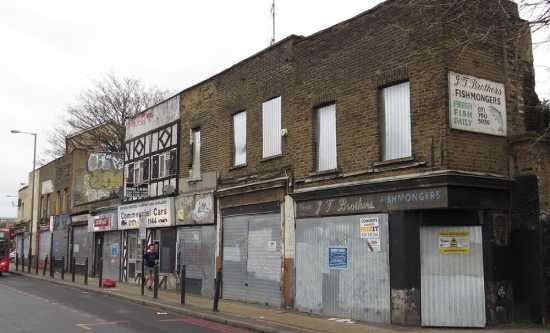
For the second time in five years, ‘retail tsar’ Bill Grimsey is leading a ‘troubleshooting task force’ that aims to revive Britain’s half-empty high streets. It comes after two of Britain’s best-known retailers, Toys R Us and electronics specialist Maplin, collapsed into administration on the same day in February, putting 5,500 jobs at risk. Fashion retailer New Look then said up to 60 stores would close, putting almost 1,000 jobs at risk, and Conviviality, the company behind the off-licence chains Bargain Booze and Wine Rack, announced it would be appointing in administrators, threatening 2,600 jobs. Elsewhere, restaurant chains including Jamie Oliver, Prezzo and Byron have all announced closures amid a severe downturn in trading. In the first half of 2017, 14 shops closed every day. Britain’s semi-derelict town centres perfectly illustrate a decaying capitalism that needs to be put out of its misery. Brian Henry reports.
State of the nation of shopkeepers
See one town centre in Britain and you have seen them all. The same big name chains dominate: the same restaurants, the same bars, the same cinemas, the same music and fashion shops, all gleaming and soulless. Even knock-offs and tat have been monopolised by Sports Direct and Poundland. Variety and character be damned. This is the dreary monoculture of 21st century consumerism, the manifestation of the demands of capital accumulation. And yet, in the sixth richest country in the world, each of these mini corporate meccas is punctuated and surrounded by shuttered and abandoned shops and stores, skeletons scattered among their living conquerors. It’s a turf war, and the gang with the bigger muscle always wins.
Grimsey, a retail veteran who previously headed up Wickes and Iceland, will document the latest round of ‘lessons learned’ and attempt to attract capital to beautify the eye sores. Although self-appointed, his original review was closely followed in Westminster and a copy was despatched to then prime minister David Cameron. Downing Street is always tremendously concerned by the state of the high street; Little England is a nation of shopkeepers, after all. More importantly, the total value of UK retail sales in 2016 was £358bn, slipping to 7.3% of GDP compared to 8% at the start of the decade; the sector accounts for around 10% of jobs in Britain, and the British Retail Consortium warned last year that the total had fallen by 3%, the highest rate since records began in 2008, because of technological changes and rising costs.
Predictably, Grimsey recommended a business rates freeze. But the government, desperate to fill the gaping hole in the public finances from somewhere, pressed on with last year’s revaluation and a 3% rise, handing retailers significant bill increases in parts of the country where property prices have surged. Such are the contradictions of capitalism.
In 2011, Cameron had asked Mary Portas, TV’s ‘Queen of Shops’, to carry out a similar exercise in the face of record numbers of empty shops. And yet here we are again. Grimsey said the new review, to be published in the summer, would look at successful examples of retail regeneration projects and what more could be done to help local authorities cope with the structural changes in the retail sector. In practice this probably amounts to searching out corrupt councils to subsidise gentrification schemes.
Online competition
Competition in retail of course goes beyond the high street now. The phenomenal shift towards online shopping over the past decade saw nearly £60bn spent via phones and tablets in 2017, equating to more than £1 in every £6 spent on the high street. This trend is growing by 10% a year. Online retailers have reaped the rewards at the expense of the high street while enjoying lower operating costs that enable them to sell stock at reduced prices. Internet megastore Amazon was founded by Jeff Bezos in 1994 – he is now the world’s richest person, worth $131bn.
Matthew Hopkinson, founder of retail consultancy DataIntel and one of six experts collaborating with Grimsey, says online shopping ‘has been a catalyst that has reinforced the fact that we have too many shops in the UK. Around 10% of the UK retail stock is surplus to requirements, which equates to about 50,000 stores.’
Inflation, hovering around 3% in the wake of the Brexit vote and a devalued pound, has been another recent factor in flatlining sales growth as households tighten their spending. But none of these can be pinpointed as the main or root problem that can be fixed in order to reverse the fortunes of the high street. They are symptoms of a deeper malaise. As the capitalist crisis deepens, it becomes necessary for businesses to accelerate the turnover of profits, making it harder to survive. The demands of capital accumulation mean corporations will grow larger still and marginalise weaker competitors, whose profits will fall until they become the ‘next Woolworths’. People will lose their jobs and have less money to buy the things companies need to sell to survive. And so on and so forth. Eventually the capitalist serpent will run out of tail to eat.




